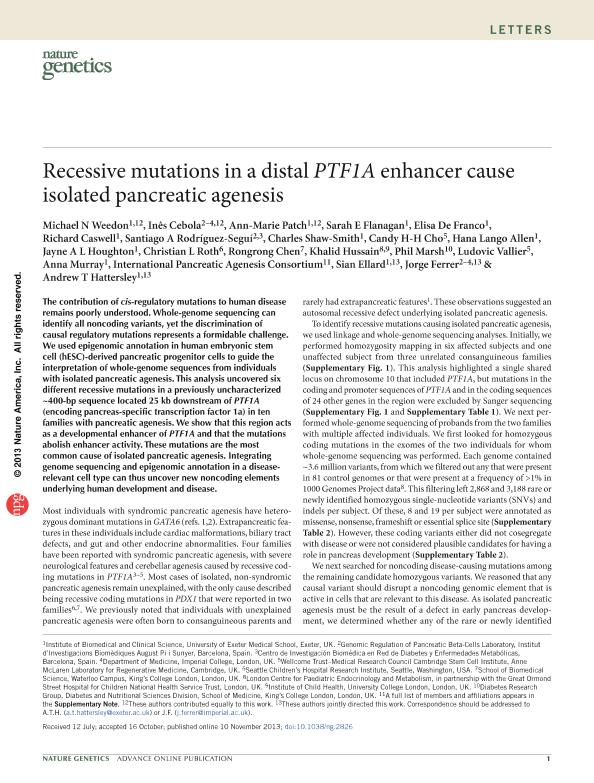Artículo
Recessive mutations in a distal PTF1A enhancer cause isolated pancreatic agenesis
Weedon, M. N.; Cebola, I.; Patch, A. M.; Flanagan, S.; De Franco, E.; Caswell, R.; Rodríguez Seguí, Santiago Andrés ; Shaw Smith, C.; Cho, C.; Allen, H. L.; Houghton, J.; Roth, C. L.; Chen, R.; Hussain, K.; Marsh, P.; Vallier, L.; Murray, A.; International Pancreatic Agenesis Consortium; Ellard, S.; Ferrer, J.; Hattersley, A. T.
; Shaw Smith, C.; Cho, C.; Allen, H. L.; Houghton, J.; Roth, C. L.; Chen, R.; Hussain, K.; Marsh, P.; Vallier, L.; Murray, A.; International Pancreatic Agenesis Consortium; Ellard, S.; Ferrer, J.; Hattersley, A. T.
 ; Shaw Smith, C.; Cho, C.; Allen, H. L.; Houghton, J.; Roth, C. L.; Chen, R.; Hussain, K.; Marsh, P.; Vallier, L.; Murray, A.; International Pancreatic Agenesis Consortium; Ellard, S.; Ferrer, J.; Hattersley, A. T.
; Shaw Smith, C.; Cho, C.; Allen, H. L.; Houghton, J.; Roth, C. L.; Chen, R.; Hussain, K.; Marsh, P.; Vallier, L.; Murray, A.; International Pancreatic Agenesis Consortium; Ellard, S.; Ferrer, J.; Hattersley, A. T.
Fecha de publicación:
01/2014
Editorial:
Nature Publishing Group
Revista:
Nature Genetics
ISSN:
1061-4036
Idioma:
Inglés
Tipo de recurso:
Artículo publicado
Clasificación temática:
Resumen
The contribution of cis-regulatory mutations to human disease remains poorly understood. Whole-genome sequencing can identify all noncoding variants, yet the discrimination of causal regulatory mutations represents a formidable challenge. We used epigenomic annotation in human embryonic stem cell (hESC)-derived pancreatic progenitor cells to guide the interpretation of whole-genome sequences from individuals with isolated pancreatic agenesis. This analysis uncovered six different recessive mutations in a previously uncharacterized ∼400-bp sequence located 25 kb downstream of PTF1A (encoding pancreas-specific transcription factor 1a) in ten families with pancreatic agenesis. We show that this region acts as a developmental enhancer of PTF1A and that the mutations abolish enhancer activity. These mutations are the most common cause of isolated pancreatic agenesis. Integrating genome sequencing and epigenomic annotation in a disease-relevant cell type can thus uncover new noncoding elements underlying human development and disease.
Palabras clave:
PANCREAS
,
AGENESIS
,
PTF1A
,
ENHANCER
Archivos asociados
Licencia
Identificadores
Colecciones
Articulos(IFIBYNE)
Articulos de INST.DE FISIOL., BIOL.MOLECULAR Y NEUROCIENCIAS
Articulos de INST.DE FISIOL., BIOL.MOLECULAR Y NEUROCIENCIAS
Citación
Weedon, M. N.; Cebola, I.; Patch, A. M.; Flanagan, S.; De Franco, E.; et al.; Recessive mutations in a distal PTF1A enhancer cause isolated pancreatic agenesis; Nature Publishing Group; Nature Genetics; 46; 1; 1-2014; 61-64
Compartir
Altmétricas



